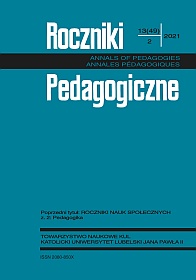Learning Process Orientation in Educational Policy of Singapore (Axiological Aspects of Paradigm Change) (Axiological aspects of paradigm change)
Main Article Content
Abstract
The aim of the article is to identify the determinants of changes in the school development approach and learning processes. Another scientific goal is to show that the introduced political interventions have changed the Singaporean schools. The concepts and solutions, which were adopted in the school system, determine the educational success of this country. I would like to present the reforms and political interventions which contribute to a better understanding of educational policy. The effective implementations of reforms focused on learning processes and on conditions of schools to react quickly to educational changes. The results presented in the article are mainly based on the literature review or research, undertaken by researchers, or analysis of source documents.
Article Details
References
Chałas, K. (2004). Wychowanie ku wartościom. Elementy teorii i praktyki. T. 1. Lublin–Kielce: Wydawnictwo Jedność.
Chałas, K. (2018). Przyszłość należy do świadomych i aktywnych obywateli. Jakie kompetencje są im niezbędne? Jak skutecznie je kształtować? (Perspektywa aksjologiczna). W: S. M. Kwiatkowski (red.), Kompetencje przyszłości (s. 30-67). Warszawa: Wydawnictwo FRSE.
Chiang, C. F. (1999). Education: New directions. W: G. L. Ooi, R. S. Rajan (red.), Singapore: the year in review 1998 (s. 65-76). Singapore: Times Academic Press.
Darling-Hammond, L., Rothman, R. (red.) (2011). Teacher and leader effectiveness in high-performing education systems. Washington, DC: Alliance for Excellent Education–Stanford, CA: Stanford Center for Opportunity Policy in Education.
Dziaczkowska, L. (2016). Wspólnota. W: K. Chałas, A. Maj (red.), Encyklopedia aksjologii pedagogicznej. Radom: Polskie Wydawnictwo Encyklopedyczne Polwen.
External Review Team. (1997). Learning, creating, and communicating: A Curriculum review. Singapore: Ministry of Education.
Fullan, M. (1993). Why teachers must become change. Educational Leadership, 50 (6), 12-17.
Fullan, M. (2006). Leading professional learning. The School Administrator, 10-14. https:// michaelfullan.ca/wp-content/uploads/2016/06/13396072310.pdf [dostęp: listopad 2018].
Gromkowska-Melosik, A. (2015). Elitarne szkolnictwo średnie. Między reprodukcją społeczno-kulturową a ruchliwością konkurencyjną. Poznań: Wydawnictwo Naukowe UAM.
Harris, A., Chrispeels, J. (red.) (2008). International perspectives on school improvement. London: Routledge.
Hattie, J. (2009). Visible learning. Abingdon: Routledge.
IBE. (2016). Program Międzynarodowej Oceny Umiejętności Uczniów. Wyniki Badania 2015 w Polsce. Warszawa: Instytut Badań Edukacyjnych.
IMD. (2020). World Competitiveness Ranking. https://worldcompetitiveness.imd.org/rankings/ WCY [dostęp: 15.12.2020].
Kwiatkowski, S. T., Nowosad, I. (2018). System kształcenia i doskonalenia nauczycieli w Singapurze. Między utopijną wizją a rzeczywistością. Studia Edukacyjne, 47, 147-171.
Lee, D., Tay, W. Y., Hong, H. (2015). Professional learning communities: A movement for leacher-led professionalism (NIE Working Paper Series No. 6). Singapore: National Institute of Education.
Lee, S. K., Goh, C. B., Fredriksen, B., Tan, J. P. (red.) (2008). Toward a better future: Education and training for economic development in Singapore since 1965. Washington, DC: The World Bank.
Louis, K. S., Smith, B. (1991). Restructuring, teacher engagement and school culture: Perspectives on school reform and the improvement of teacher’s work. School Effectiveness and School Improvement, 2, 34-53.
Luke, A., Freebody, P., Shun, L., Gopinathan, S. (2005). Towards research-based innovation and reform: Singapore schooling in transition. Asia Pacific Journal of Education, 25(1), 225-238.
MOE, Ministry of Education (1997). Masterplan for Information Technology in Education. Singapore, MOE.
MOE, Ministry of Education (2020). Academy of Singapore Teacher. https://academyofsingaporetea chers.moe.edu.sg/programmes-publications/professional-development-programmes/outstanding- educator-in-residence-oeir-programme [dostęp: 11.11.2020].
Ng, E. H. (2008). Speech by Dr Ng Eng Hen, Minister for Education, Ministry of Education Website. www.moe.gov.sg.
Nowak, M. (2008). Teorie i koncepcje wychowania. Warszawa: WAiP.
Nowosad, I. (2011). O potrzebie integralnego podejścia do zmian w edukacji szkolnej. Od zmian w szkole do zmiany szkoły. Studia Pedagogiczne, 64, 27-42.
Nowosad, I. (2018). Polityka edukacyjna Singapuru. Orientacja na jakość i efektywność. W: R. Nowakowska-Siuta, K. Dmitruk-Sierocińska (red.), Polityka oświatowa w perspektywie porównawczej. Kraków: Oficyna Wydawnicza Impuls.
Nowosad, I. (2020). Professional Learning Community (PLC) w Singapurze: możliwości i ograniczenia w kształtowaniu wysokiej jakości edukacji. Rocznik Pedagogiczny, 43, 63-79.
OECD. (2011). Lessons from PISA for the United States, strong performers and successful reformers in education. Paris: OECD Publishing.
Schleicher, A. (2019). Edukacja światowej klasy. Jak kształtować systemy szkolne na miarę XXI wieku. Tłum. K. Kwiatosz. Warszawa: Związek Nauczycielstwa Polskiego–Fundacja im. Friedricha Eberta. Przedstawicielstwo w Polsce.
Siegień, A. J. (2005). Paradygmat. W: T. Pilch (red.), Encyklopedia pedagogiczna XXI wieku. T. 4. Warszawa: Wydawnictwo Akademickie „Żak”.
Słownik języka polskiego (1996). Red. W. Doroszewski. T. 3. Warszawa: Wydawnictwo Naukowe PWN.
Słownik wyrazów obcych (1980). Red. J. Tokarski. Warszawa: PWN.
Suwalska, A. (2018). Culture of teaching in finnish schools in context of educational change. Polish Journal of Educational Studies, 71(1), 112-122. DOI: 10.2478/poljes-2018-0010
Suwalska, A. (2019). The direction of educational reforms and challenges for sustainable development in Finnish education. Forum Pedagogiczne, 9(2/2), 259-269. DOI: 10.21697/ fp.2019.2.43
Stoll, L., Reynolds, D., Creemers, B., Hopkins, D. (1996). Merging school effectiveness and school improvement: Practical examples. W: R. Bollen, B. P. M. Creemers, D. Hopkins, N. Lagerweij, D. Reynolds, L. Stoll, (red.), Making good schools. Linking school effectiveness and improvement (s. 113-147). London–New York: Routledge.
Śliwerski, B. (2015). Edukacja (w) polityce. Polityka (w) edukacji. Inspiracje do badań polityki oświatowej. Kraków: Oficyna Wydawnicza Impuls.
Tan, C., Ng, P. T. (2007). Dynamics of change: Decentralised centralism of Education in Singapore. Journal of Educational Change, 8(2), 155-168. DOI: 10.1007/s10833-006-9016-4
Welland, A. P. (2004). Jak żegnać lokalne paradygmaty? O metodologii wywiadu i naukowych wspólnotach dyskursu. Kultura i Społeczeństwo, 1, 208.

